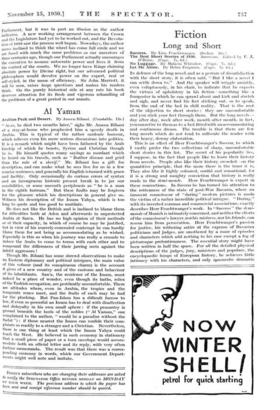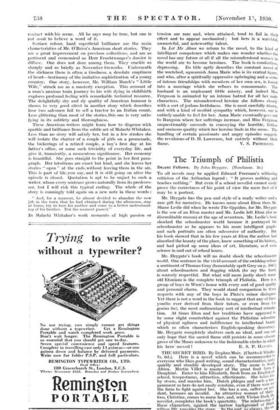Fiction
Long and Short
Success. By Lion Feuehtwanger. (Seeker. 10s.)
The Best Short Stories of 1930. American. Edited by E. J.
O'Brien. (Cape. 7s. Od.)
No Luggage. By Malachi Whitaker. (Cape. 7s. Gil.) Let Me Alone. By Helen Ferguson. (Cape. 7s. Bd.) IN defence of the long novel, and as a gesture of dissatisfaction with the short story, it is often said, " But I like a novel I can settle down to." And the speaker will wriggle amiably, even voluptuously, in his chair, to indicate that he expects the virtues of upholstery in his fiction—something like a fourposter in which he can sprawl about and kick and stretch and sigh, and never find his feet sticking out, so to speak, from the end of the bed in chill reality. That is the root of the objection to short stories : they are uncomfortable and you stick your feet through them. But the long novels— day after day, week after week, month after month, in fact, you can retire to them as to a bed fitted with an accommodating and continuous dream. The trouble is that there are few long novels which do not tend to suffocate the reader with their heavy, downy elaboration.
This is an effect of Herr Feuchtwanger's Success, to which I vastly prefer the two collections of sharp, uncomfortable short stories in this list. The secret of his popularity lies, I suppose, in the fact that people like to learn their history from novels. People also like their history crowded—on the quantitive principle, that the more there is the truer it is. They also like it highly coloured, sordid and sensational, for it is a strong and naughty conviction that history is really made in the demi-monde. Herr Feuchtwanger is expert in these concoctions. In Success he has turned his attention to the rottenness of the state of post-War Bavaria, where an innocent connoisseur of "daring" modern pictures is made the victim of a rather incredible political intrigue. " Daring," with its inverted commas and commercial associations, exactly describes Herr Feuchtwanger's work. In "Success" the demi- monde of Munich is intimately concerned, and neither the efforts of the connoisseur's lawyer, norhis mistress, nor his friends, can rescue him from persecution. Herr Feuchtwanger's passion for justice, his withering satire at the expense of Bavarian politicians and judges, are smothered by a maze of episodes and characters which add nothing to his case except a fog of picturesque pretentiousness. The essential story might have been written in half the space. For all the detailed physical descriptions of the judges, jury, ministers and populace, the encyclopaedic lumps of European history, he achieves little intimacy with his characters, and only spasmodic dramatic
contact with his scene. All he says may be true, but one is not made to believe a word of it.
Surface colour, hard superficial brilliance are the main characteristics of Mr. O'Brien's American short stories. They are a great improvement on previous collections, and are as pertinent and economical as Herr Feueldwanger's dossier is diffuse. One does not doze among them. They crackle as sharply and as briefly as November fireworks. Underneath the slickness there is often a tiredness, a desolate emptiness of heart—testimony of the imitative sophistication of a young country. One story, however, Mr. William March's " Little Wife," struck me as a masterly exception. This account of a man's anxious train journey to his wife dying in childbirth explores profound feeling with remarkable technical resource. The delightfully dry and sly quality of American humour is shown to very good effect in another story which describes how two salesmen fail to sell a tractor to an Italian count. Less glittering than most of the stories, this one is very satis- fying in its subtlety and thoroughness.
These American writers might learn how to dispense with sparkle and brilliance from the subtle art of Malachi Whitaker. Less than no story will satisfy her, but in a few strokes she will isolate the chatter of a couple of girls on a promenade, the bickerings of a retired couple, a boy's first day at his father's office, or some such triviality of everyday life, and give it, transiently, a momentous significance. Her economy is beautiful. She goes straight to the point in her first para- graph. Her intuitions are exact but kind, and she leaves her stories " open " at the ends, without leaving them in the air. This is part of life, you say, and it is still going on after the episode is closed. Quotation is apt to be unjust to suds a writer, whose every sentence grows naturally from its predeces- sor, but I will risk this typical ending. The whole of the story is cunningly told again on a new note in these words : " And, for a moment, he almost decided to abandon the new job in the town that he had obtained during the afternoon, stay at home, try to love his mother and come to a better understand- ing of his brother. But the moment passed."
In Malachi Whitaker's work moments of high passion or
tension are rare and, when attained, tend to fail in their effect and .th appear. mechanical ; but hers is a watchful, unwasteful, and noteworthy talent.
In Let Me Alone we return to the novel, to the kind of intelligent competence which makes one wonder whether the novel has any future at all if all the misunderstood women in the world are to become heroines. The book is comfortless, depressing. Its title aptly describes the constant mood of the wretched, squeamish Anna Marie who is its central figure, and who, after a spiritually oppressive upbringing and a series of intense friendships with members of her own sex, is forced into a marriage which she refuses to consummate. The husband is an unpleasant little misery, and indeed Mg Ferguson is animated by an intense hatred for all her male characters. The misunderstood heroine she follows closely with a sort of jealous fretfulness. She is most carefully draws, and with a kind of morbid sympathy which, however, one is entirely unable to feel for her. Anna Marie eventuallygeses out to Flangdon where her sufferings increase, and Miss Ferguson unquestionably succeeds in conveying the horrible, listless and ominous quality which her heroine finds in the scene. The handling of certain passionate and angry episodes suggests the revulsions of D. H. Lawrence, but entirely without their









































 Previous page
Previous page